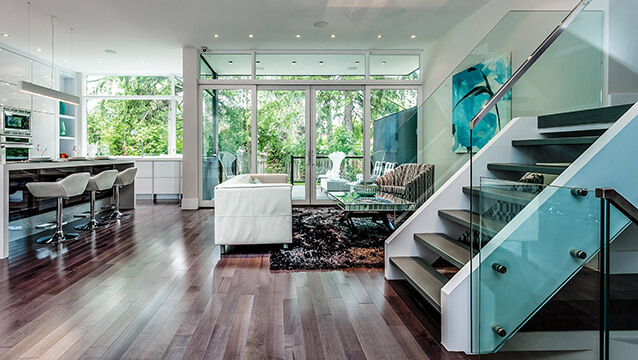Smart Windows Are Smart Additions to Your Space
Apr 02, 2024
A new class of glass has arrived. It’s called “smart” or “dynamic” or “active” glass, and it has the potential to make your space more comfortable while also cutting your energy bill—all at the flick of a switch (or less).
What makes glass “smart” or dynamic is its ability to go from clear to opaque (or vice versa) in the blink of an eye. If you’ve ever seen eyeglasses that turned into sunglasses when the wearer went outside, you’ve seen dynamic glass.
After being used in commercial buildings for years, “dynamic glazing” is now showing up in products for your home. Have you ever wanted to “dial down” the sunlight in certain rooms that get uncomfortably hot or bright? Would you like to skip expensive curtains or shades in parts of your home and still have privacy? Ever wished you could temporarily “fog” the windows in a particular bedroom or bathroom to avoid people looking in? “Smart glass” makes all this possible by enabling smart windows that change appearance on command or in response to set conditions.
And lots of manufacturers are getting into the smart window game, including familiar names such as Pella and Marvin.
Glass That Performs Different Ways to Save Money and Create Space
Smart windows come in various modes, depending on your need. Some use a coating that responds to heat or light; others use a ceramic glaze or liquid crystal film that shifts color in the presence of electricity. Whatever format you choose, though, smart glass can lower your energy bill and even the cost of decorating your home.
Here’s how. I love the summer sun—that is, until it bleaches out my floors and furniture and jacks up my cooling bill. With smart windows, though, I can flip a switch during the hottest part of the day to trim the light coming in my windows. As soon as the sun passes, I can change the window glass back to clear again and enjoy the view.
An alternative kind of window doesn’t rely on electricity to change color. Instead, chemical coatings automatically respond when the amount of light or outdoor temperature hits a set point. On sunny summer days, the glass goes translucent to block light as the temperature rises. Sunny day in the winter? The glass stays clear to let in warming rays.
But dynamic glass can do more than affect windows. Think of a conference room at work with active glass walls. Flip a switch, and one of the walls becomes opaque, so it can be used as a projection screen or just to provide privacy. Now, take that idea into your home. Imagine being able to create a “room” or workspace in an open floor plan via a room divider made of dynamic glass. Flip the switch—and you’ve given an overnight guest a private place to sleep or defined an office in the middle of a busy home.
This is “magic” glass: Now you see it; now you don’t.
What Kind of Smart Glass is Right for You?
There are four basic kinds of smart glass technology. Deciding what’s right for you depends on your particular needs.
Electrochromic glass. These windows use a ceramic coating sandwiched between two layers of glass that darkens when electric voltage is applied. To reverse the tint, simply apply voltage again. This feature can be turned on from an electric switch, programmed timer, light sensor, motion sensor, or smartphone.
Photochromic glass. Like clear eyeglasses that transform into sunglasses, these windows darken in response to strong light. On the plus side, they’re automatic and effective at reducing glare. On the minus side, they’ll darken on a sunny day in winter when you actually might want to let in light.
Thermochromic glass. These windows are heat-sensitive. When the temperature rises to a set point, the glass transitions to a tinted state; as exterior conditions cool, the glass becomes clear. Again, these require no input from you. Another bonus: In winter, these windows won’t darken on sunny days.
Liquid crystal technology. These windows laminate a thin layer of liquid crystals plus a conductive metal coating between two pieces of glass. The material stays milky until an electric current is applied; then, the crystals “line up,” and the glass turns transparent. While great for protecting privacy, liquid crystal windows aren’t effective in blocking heat or light.
Smart Film. A further option for the DIY crowd is “smart film.” This material embeds liquid crystals in plastic sheeting that’s Wi-Fi-enabled and paired with a smartphone app, and which can be cut to fit existing windows. However, this technology might be trickier for the homeowner who’s less than expert.
We are Here to Serve You
At McCann Windows & Exteriors, we’re happy to help you create the perfect home for you, season after season. Please give us a call with any questions about restoring, repairing or replacing your windows and home exterior. We’re ready to serve you, and estimates are free. Just visit https://mccannwindow.com or call (847) 562-1212 to schedule a convenient time.













